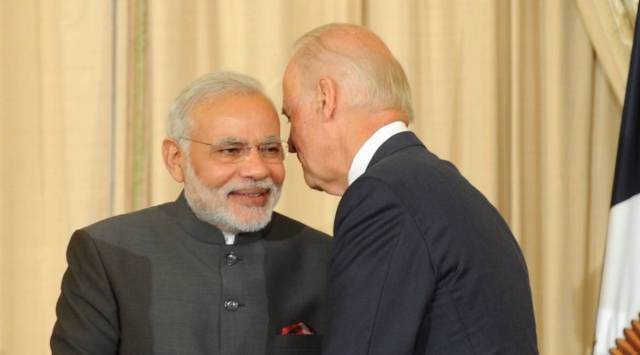Setting the stage for a new chapter in Indo-US ties, Prime Minister Narendra Modi congratulated Joe Biden and Kamala Harris Saturday night, soon after the elections in US were called in their favour.

“I look forward to working closely together once again to take India-US relations to greater heights,” he added.
In a separate post congratulating Harris, the Prime Minister said: “Your success is pathbreaking, and a matter of immense pride not just for your chittis, but also for all Indian-Americans. I am confident that the vibrant India-US ties will get even stronger with your support and leadership.”
Story continues below this ad
Explained| What does President-elect Joe Biden mean for India and its relationship with the US?
Biden has been a strong advocate of deepening US ties with India, even before he became Vice President in the Obama administration.
He played an important role, both as Chairman of the Senate Foreign Relations Committee and later as Vice President, in systematically deepening strategic engagement with India.
In fact, in 2006, three years before he became Vice President, Biden announced his vision for the future of US-India relations: “My dream is that in 2020, the two closest nations in the world will be India and the United States.”
Story continues below this ad
Although Senator Obama was initially hesitant to support the Indo-US nuclear deal, Biden led the charge and worked with both Democrats and Republicans, to approve the nuclear deal in the US Congress in 2008.
Predictable policies| A Joe Biden win may bode well for Indian markets
He was one of the key advocates of strengthening the Indo-US partnership, especially in strategic areas. In fact, during that time, the US officially declared its support for India’s membership in a reformed and expanded United Nations Security Council. This had been a key demand of successive Indian governments, which was fulfilled by Washington during Biden’s term as Vice President.
The Obama-Biden administration also named India a Major Defense Partner — a status approved by the US Congress — which made it easier to share advanced and critical technology with India to strengthen defence ties. This was crucial since it was for the first time that any country was given this status, outside of the traditional alliance system of the US.
Story continues below this ad
In fact, in the last few months of the Obama administration, the two sides signed the Logistics Exchange Memorandum of Agreement (LEMOA), first of three foundational pacts, in August 2016. The Trump administration signed the remaining foundational pacts — Communications Compatibility and Security Agreement (COMCASA) and Basic Exchange and Cooperation Agreement for Geo-Spatial Cooperation (BECA).
Obama and Biden also strengthened cooperation with India to fight terrorism in their countries and across the region. “Biden believes there can be no tolerance for terrorism in South Asia — cross-border or otherwise,” his campaign document stated.
While there is not much he said during his time in the administration on Pakistan-sponsored terrorism, New Delhi hopes he will carry forward the legacy of the US administration’s approach on India-Pakistan when it comes to cross-border terrorism.
Over the last few years, there has been realisation in Washington about China’s aggressive behaviour, and a somewhat bipartisan consensus as well among Democrats and Republicans on China as a strategic rival and a threat.
Story continues below this ad
While the Trump administration has been extremely vocal in supporting India over the border standoff with China, New Delhi will expect a similar approach from the Biden administration too.
“A Biden administration will also work with India to support a rules-based and stable Indo-Pacific region in which no country, including China, is able to threaten its neighbours with impunity,” his campaign document stated.
While Trump administration officials, including US Secretary of State Michael R Pompeo, had been attacking the Communist Party of China quite openly, the Biden administration’s language might be a bit more calibrated.
The issue of immigration and visas for Indians, especially H1B visas for skilled professionals, has been a major concern for Indians under the Trump administration.
Story continues below this ad
As Democrats in recent years have been seen to be more liberal towards immigration, Biden is expected to be softer towards Indians who go to the US to study, work and live there, and aspire for a better life.
He has promised to support family-based immigration, increase the number of visas offered for permanent, work-based immigration, reform the temporary visa system for high-skill, specialty jobs, eliminate the limits on employment-based Green Cards. He has also promised to restore the naturalisation process for Green Card holders.
But it may not be very easy for Biden to reverse some of the approaches adopted in the last four years when the Trump administration tightened the rules.
His attitude on human rights issues – and given that Harris too is a fierce advocate of rights – has led to some unease in New Delhi which got support from the Trump administration on the issue of Jammu and Kashmir.
Story continues below this ad
Although some US Congress members red-flagged the rights situation following the removal of Article 370 and the passage of the Citizenship (Amendment) Act and implementation of the NRC, the Trump administration had not taken any action apart from making some perfunctory statements.
But with Democrats in power, the Indian government can expect some tough statements from the Biden administration on these issues.









